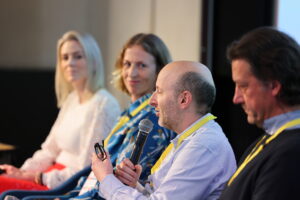THINK Drug Discovery commercialisation model featured in Research Australia
News Stories

There are numerous challenges associated with discovering and developing novel drugs for paediatric cancer. A recent article in Research Australia’s Inspire ‘Commercialisation’ issue details how Luminesce Alliance are working to overcome them by developing robust collaborative models with sustainable funding, allowing us to find new therapeutics for kids with cancer in Australia.
Around 1,000 children and adolescents are diagnosed with cancer each year in Australia.
THerapeutic INnovations for Kids (THINK) is a drug discovery and development pipeline for generating new therapies to better treat children with cancer, available to researchers in Luminesce Alliance partner organisations. THINK is funded by Luminesce Alliance and delivered by Children’s Cancer Institute, as part of Luminesce Alliance Enabling Platforms program.
‘Drug discovery fascinates me,’ says Prof Ian Street, Director of THINK.
‘Even after 35 years in this field it still amazes me that we can design a ‘targeted’ molecule that, when given to a patient in tiny amounts, will seek out its target and halt its cancer-causing activity.
“However, for many reasons completely unrelated to our ability to produce these targeted therapies, progress in drug development for children with cancer has been slow, and many parents and families discover that the treatment options available for children today have changed little to those offered 30 years ago.”
Overcoming key challenges
Historically, biotech and pharmaceutical companies that have successfully brought new therapies to adult cancer patients have been reluctant to engage in paediatric drug development, dissuaded by the prospect of low commercial returns and complex regulatory hurdles.
A review of FDA approvals between 2012-2021 revealed that only 39/341 (11.4%) approved oncology indications were for paediatric cancers.
This lack of commercial investment means that the true economic cost of children’s cancer is assumed by the public health system (government and the taxpayer) and, because of the lack of modern and more effective and less toxic treatments, these costs can continue throughout life.
Traditionally, academia has led discovery biology. Our understanding of the genomic landscape in paediatric cancers is described by academic consortia globally that have identified the key underlying biological drivers and novel drug targets.
However, this increase in knowledge has not yet translated to an increase in new drug approvals. In response, regulatory bodies in the United States and Europe have enacted new policies to encourage drug development for paediatric cancers.
Yet, despite these commercial incentives, it is academic, government, philanthropic and not-for-profit groups that are driving the development of novel therapeutics.
Drug discovery and development is expensive and time consuming, and only through collaboration will these non-commercial groups muster the funding and resources needed to change the therapy landscape in paediatric cancer.
Further, paediatric cancer drivers are often not addressable with conventional small molecule drugs. THINK is developing a novel approach known as Small Molecule Induced Reading Frame Shift (SMIRFS) which targets RNAs not proteins, turning “undruggable” targets into “druggable” targets.
Developing a robust and collaborative model with long-term sustainable funding
Successful collaborative models have been formed in the past to discover, develop and fast track novel therapeutics for approval.
In Australia, one of the most successful collaborative models was the Cancer Therapeutics (CTx) consortium which generated eight licensed clinical drug candidates in adult cancer. Importantly, the commercialisation success from these collaborative models provides the financial return to fund future projects, thus creating a long-term sustainable environment for novel drug discovery and development.
THINK aims to replicate these robust and collaborative models to generate:
- a virtual pharmaceutical network consisting of infrastructure, academic researchers, drug discovery biologists and chemists, and
- a project portfolio, funded by government, philanthropy, venture capital, and pharmaceutical companies, with the goals of finding novel clinical drug candidates for paediatric cancers first and driving these toward clinical trials, commercialisation, and novel treatments in the clinic for kids with cancer.
This article is reproduced with the kind permission of Research Australia.
More information
- Read the article: THINK: Developing a sustainable collaborative model for novel paediatric cancer drug discovery and commercialisation in Australia
- Read the Research Australia publication: Research Australia Inspire Issue 35 – Industry Commercialisation
- Find out how to access the THINK Advance Therapeutics Pipeline
- View Luminesce Alliance Conference 2024: Session 3.2 Innovation and Commercialisation Opportunities: Paediatric Cancer Drug Discovery Innovation
L-R Dr Jess Smith, Brandon Capital Partners; Dr Julia Warning, NSW Health; Prof David Ziegler, Sydney Children’s Hospital Network and A/Prof Greg Arndt, Children’s Cancer Institute, at the Luminesce Alliance Conference 2024 panel discussion: 3.2: Innovation and Commercialisation Opportunities: Paediatric Cancer Drug Discovery Innovation and the Road to Commercialisation
Authors
Professor Ian Street, Director of THINK, Children’s Cancer Institute (CCI).
Ian is a Conjoint Professor UNSW Sydney and joined Children’s Cancer Institute in 2020. He completed his PhD in Canada, spending the next 11 years working in the pharma/biotech industry in North America and Australia, then 20 years at the Walter and Eliza Hall Institute, as Laboratory Head and Chief Scientist of the Cancer Therapeutics Cooperative Research Centre.
A/Prof Greg Arndt, Head of Drug Discovery Biology, THINK, CCI.
Greg has held several university positions and is currently a Conjoint Associate Professor UNSW Sydney. Prior to joining Children’s Cancer Institute in 2009 to establish the ACRF Drug Discovery Centre, Greg spent 16 years at Johnson & Johnson Research, including as Research Director of the Target Discovery Program.
Dr Keith Sia, Senior Drug Discovery Officer, THINK, CCI.
Keith has extensive experience in cancer biology research prior to joining THINK. He now applies his expertise to drug screening and development, to progress novel therapeutic agents through to approval.
